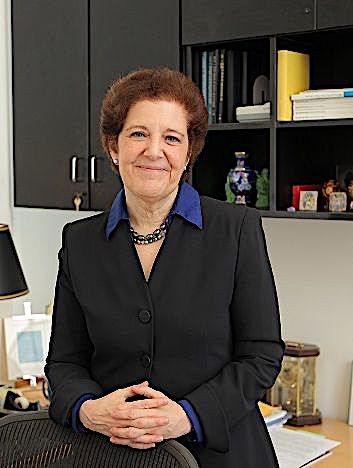
Dr. M. Elizabeth Ross is the Nathan Cummings Professor of Neurology, head of the Laboratory of Neurogenetics and Development, and director of the Center for Neurogenetics in the Feil Family Brain and Mind Research Institute. She talked to the New York Genome Center (NYGC) about her research and collaboration with their organization.
Q. What is the focus of your research at the Center for Neurogenetics, Feil Family Brain and Mind Research Institute at Weill Cornell Medicine?
A. We study how genes direct the construction of the brain to establish its cellular organization and connectivity.
In my lab, the focus is on finding single gene mutations and complex genetic interactions that underlie diseases of the nervous system in children and adults. In particular, we study brain malformations that are likely caused by disruption of a single gene and neural tube defects like spina bifida that are caused by a complex interplay of gene variation and environmental factors. We then investigate the normal and altered biological function of those genes in development and aging.
Our research in the center pursues whole genome sequencing of patients for whom standard clinical exome sequencing has not resolved the genetic cause of their condition. For disorders that are likely to be monogenic (linked to one gene), like microcephaly (small brain) or lissencephaly (smooth brain), it may be possible to find the causative mutation with only the affected individual and his/her parents. However, complex genetic disorders require investigation of hundreds if not thousands of cases. Examples of complex genetic disorders include spina bifida in children, or in the adult population those with common forms of Parkinson’s or dementia. Since the center was established a year ago, we’ve been enrolling many patients through Weill Cornell Medicine, as well as families who are referred to our studies from across the country and internationally.
Q. What collaborative research projects are you doing with NYGC?
A. We’ve had very successful collaborations with NYGC, utilizing their next-generation sequencing and bioinformatics services, as well as their clinical laboratory.
Our collaborative work with NYGC is on the frontier of molecular medicine and we hope our research can contribute to knowledge of how non-coding as well as protein coding regions of the genome can contribute to neurological disease. We share an interest in investigating “dark matter”— the 98 percent of the genome whose function we don’t yet fully understand. We are working together with NYGC to help translate genomic research into more effective clinical practice through assessing a person’s risk load for a particular disorder, so that we have a chance to prevent it or lessen symptoms that might arise.
With their permission to participate in research, we have sent dozens of samples to NYGC from families with brain malformations for whole genome sequencing – which is not standard clinical practice yet. With whole genome sequencing you get so much more information than from exome sequences, and it’s more challenging to find functionally meaningful variants in the non-protein coding areas that might be disease causing. In this whole genome sequencing project we’ve been able to identify the cause of the disorder in several families, which requires direct sequencing validation. We are currently working with NYGC’s clinical, CLEP-certified lab on that validation in preparation for our functional studies.
We have and are continuing to work closely with Avinash Abhyankar, NYGC’s manager of clinical informatics, and his team. Avinash is helping us leverage the sequencing data to analytical pipeline development for the family studies. It has been a very positive experience working collaboratively with him and the other professionals at NYGC.
We are also building research interactions with NYGC on population-based analyses of whole genome sequencing data in our cohort of spina bifida sufferers, a complex genetic disorder. Spina bifida is a congenital defect, in which part of the spinal cord or nerve roots and meninges are exposed through a breach in the backbone. We are collecting additional sequences, and collaborating with NYGC’s bioinformatics team on the analysis of structural variants present in the whole genome sequencing data of patients that are absent in healthy controls.
Q. Why did you choose to collaborate with NYGC? How did it benefit your research?
A. It’s the ease of interaction, as well as the unique expertise at the Genome Center that attracted us. We really like the prospect NYGC offers of being able to interact with other genomic scientists throughout the city and the world. NYGC serves as a great hub for pioneering genomic work, and enables collaborating scientists to stay at the front line of technology. Working with NYGC certainly accelerated our progress. It stimulated better work, and created a synergistic environment that enhanced our research and made the whole process a lot more fun.
Re-posted with permission from the NYGC.